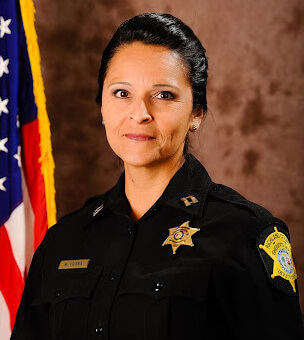1154. A Day in the Life: What's It Really Like to Be a Law Enforcement Officer?
Deputy Chief Maria Yturria

“I think that, number one, we are in a customer service role. Over 95% of our interaction with people requires the highest possible communications skills. That’s what you’re there for. You’re there to communicate and find out what they’re scared of, what they need, what their wants are, what their likes are, how you can help them. But without being able to communicate, how do you connect with people? This is foundational to our occupation.”
Captain Maria Yturria, since the original recording of this episode, has has been named Deputy Chief of the Professional Development Unit of the Richmond County Police Department . She is an FBI National Academy graduate. She has been in law enforcement since 2003, before that serving in the U.S. Army. Her assignments have included uniform patrol deputy, investigator, victim services, and Public Information Officer for the Richland County Sheriff’s Department (RCSD). She has served on the Deputy Advisory Council and been the team leader of the Crisis Management Team. Maria has worked with federal, state, and local agencies on illegal immigration, drug prevention and human trafficking. Her certifications include Hostage/Crisis Negotiator, Statewide Peer Support Team Leader, Self Defense Instructor and board member for the AUSA SC Palmetto Chapter. She’s received numerous awards throughout her career.
The Most Impactful Turning Point?
“In the year 2000, after 8 years serving in the U.S. Army, and enjoying my career as a Military Police Officer, my then-husband and I decided that being a military couple was just too difficult. It was very hard to be stationed together and the constant traveling by each of us put too much stress on our lives. At that point, I made the decision to leave the service. Soon after we moved to Columbia, South Carolina. I was attending a meeting of the Association of the United States Army, where I met Sheriff Leon Lott, the head of the Richland County Sheriff’s Department. We had a long chat and I told him about my military background, which included receiving my degree in criminal justice from the University of Maryland. To my delight he said, “Why don’t you join our department?” After a few days of meeting members of his team and learning more about his department and the kind of work I would be doing, I joined his department and have been honored to be a part of RCSD ever since.”
The Most Powerful Lessons and Experiences?
1. “I joined the U.S. Army in 1992 right after high school. I grew up in the inner city of L.A., was a latchkey kid because both my parents worked overtime to provide for me and my three siblings, so the transition into a highly structured environment where discipline is paramount was quite a challenge. Frankly it was just what I needed, and I am grateful I made that decision.”
2. “Soon after I entered the Army I joined the Military Police and enjoyed the work from the start. I ended up getting my degree in Criminal Justice from the University of Maryland, which gave me an even broader and deeper understanding of law enforcement from many important perspectives.”
3. “A vital part of my training with the Richland County Sheriff’s Department was attending the South Carolina Criminal Justice Academy. During this intensive 8-week course I learned the essential tools required to become a Class I Certified Law Enforcement Officer: driving, shooting, handcuffing techniques, self-defense and what they called verbal judo: how to communicate with different people in different situations.”
4. “Far and away the most stressful part of the job of a law enforcement officer is the unknown. You have to be able to quickly assess what’s going on in every situation you engage in with an individual or individuals using all your senses—what you see, hear, smell and much more to quickly determine how to position yourself, how you are going to respond. And you must do all of this on a moment’s notice.”
5. “This work is gratifying in so many ways. Every person who calls us has a problem of some kind that is important or even urgently vital to them. To give that individual a sense of relief that you are there to do whatever you are able to do to help them solve their problem is essential and gives this job so much meaning to me and my fellow officers.”
6. “I think in this profession, it is vitally important to have a balance in life. You know, you can’t just be about your job. You have to have a family side, you have to have a social side, a spiritual side or something like that, which guides you, so that you don’t get caught in tunnel vision.”
Connecting With Deputy Chief Maria Yturria
Website: Richland County Sheriff’s Department: https://www.rcsd.net/
Email: myturria@rcsd.net
Subscribe to the Podcast Free:
Careers: Law Enforcement Officer, Military, U.S. Army, Veteran


